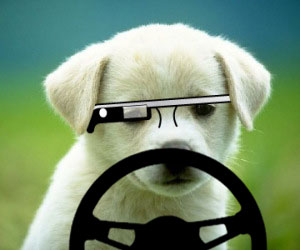I don’t see a problem with this.
In short, a West Virginia lawmaker wants to outlaw the wearing of head-mounted displays while driving in his state. The devices would join other banned electronic communication devices like cell phones. The bill, while perhaps a bit laughable at first, is logical and smart. It makes a lot more sense than banning the use of Google Glass in dive bars.
The story goes that CNET’s early Google Glass hands-on prompted the proposed legislation. CNET’s Chris Matyszczyk reached out to the bill’s sponsor, Gary G. Howell, a Republican in the West Virginia Legislature, who thankfully isn’t an ignorant Luddite. He’s just sensible.
I actually like the idea of the product and I believe it is the future, but last legislature we worked long and hard on a no-texting-and-driving law. It is mostly the young that are the tech-savvy that try new things. They are also our most vulnerable and underskilled drivers. We heard of many crashes caused by texting and driving, most involving our youngest drivers. I see the Google Glass as an extension.
Texting while driving is dangerous, and while Google Glass is, well, less emasculating, it is still a distraction. Cars are already overloaded with gadgets and screens. They have their own heads-up displays, countless dials and, worse yet, slow and unresponsive infotainment systems that seemingly control more of the vehicle with each new iteration.
If you’re driving, that’s what you should be doing. Facebook can wait.
The proposed legislation would lump head-mounted displays in with cell phones and other electronic devices currently banned from using while operating a motor vehicle. The first offense would result in a fine of $100. The second, third or subsequent offenses would cost $200 or $300, respectively.
Howell goes on to state that he’s not sure if the proposal will become law, although he’s sure other legislatures will file similar bills.
But have no fear. Google apparently saw this coming. The company already has an answer.
